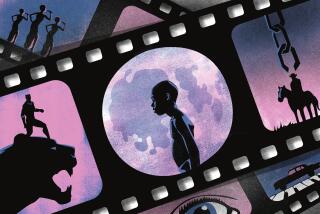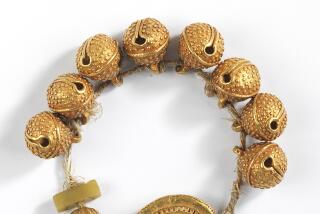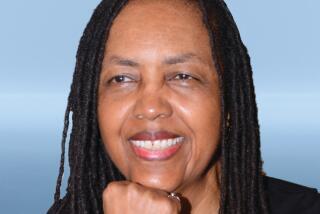IN THE REALMS OF GOLD: Pioneering in African History.<i> By Roland Oliver</i> .<i> University of Wisconsin Press: 448 pp., $24.95 paper</i>
- Share via
It is now some 50 years since African history began to be taken seriously. So long as the European empires remained entrenched in Africa, it was taken for granted that Africans had no history of their own. But once decolonization was on the agenda, historians began to investigate the African past, and over the years, they have succeeded in bringing their studies into the academic curriculum. Now this 50-year period is itself a subject of historiographical study.
Jan Vansina led the way with his “Living with Africa.” Now follows Roland Oliver, emeritus professor of African history at the School of Oriental and African Studies (SOAS), University of London. Taken together as a pair, they recall the famous distinction used by the late Isaiah Berlin for two contrasting types of intellectual--the hedgehog and the fox. Vansina is the hedgehog, dug deeply (if sometimes reluctantly) into his Madison, Wis., lair, emerging only for necessary fieldwork. Oliver is the fox, based at SOAS but ranging out boldly over a wide field of interests.
No surprise perhaps, considering his early life. Born in India in 1923, he and his parents spent most of his first seven years enjoying a life of leisure in the beautiful valley of Kashmir on three houseboats: one for them, one for the servants and the third for little Roland, cared for by successive nannies, governesses and devoted Indian retainers. When they left India, his parents spent some years in different parts of France and Belgium before settling in England and divorcing. Eventually he found a stable, satisfying life as an undergraduate student at King’s College, Cambridge, his time there interrupted by war service in the British wartime intelligence establishment at Bletchley Park. Awarded a research fellowship, he decided to follow the religious inclinations that have remained with him throughout life and study missionary history, choosing as his field a hitherto unstudied East Africa.
And then in 1948 came what Vansina has called “the birth date of African history in academia,” Oliver’s appointment to a newly founded lectureship in “the tribal history of East Africa” at SOAS. There, backed by government funding, they were waking up to realizing that African history had to be taken seriously and recruited Oliver, a young history graduate with an interest in East Africa, to start it off. However, before teaching this pioneering course, he had first to visit Africa and find out something about it. The funds were available, so in 1949 he and his new wife, Caroline Linehan, set out for what was then the Belgian Congo.
At Stanleyville (now Kisangani), they picked up a 1937 Canadian Ford station wagon, left there by a SOAS linguist colleague who had used it for fieldwork, which carried them, though with many a hiccup, safely over a year’s wanderings through East Africa. Oliver began studying the oral traditions of the Ugandan kingdoms and visiting the royal tombs. Wherever he went in East Africa, he investigated the possibility of collecting oral records and collating them with the findings of archeologists, linguists and anthropologists (who at that period tended to be hostile to historians), to create a basic methodology for the study of African history.
Back at SOAS, he spread the gospel with a small, pioneering conference of African historians in 1953 and ever-larger follow-up conferences in 1957 and 1961. In collaboration with John Fage, he provided the necessary infrastructure for a new academic discipline: a journal, the Journal of African History, founded in 1960 with a Rockefeller grant but rapidly self-supporting, and a textbook, the Penguin “Short History of Africa,” published in 1962, which has gone through six editions and been translated into 12 languages. In 1965, they started editing the monumental, eventually eight-volume, “Cambridge History of Africa,” completed in 1986. At SOAS, he built up an impressive teaching department. As the British government was now committed to founding lavishly equipped university institutions in Africa to prepare the suddenly decolonizing territories for independence, money was poured out to equip them with suitable teachers.
Meanwhile the Olivers, with their 8-year-old daughter, embarked in 1957 on another year’s tour, a 2,500-mile drive, starting in Ghana, then across to East Africa, with archeological fieldwork in Uganda and on the coast, and then south through what were still Northern and Southern Rhodesia to Cape Town, South Africa. In 1960, with funding from the Leverhulme Foundation, Oliver organized an African history conference in Salisbury (now Harare), Southern Rhodesia (now Zimbabwe), where the participants included the heads of the history departments of all the new anglophone African universities (three of them--to the dismay of the white government--were Africans). In 1962, they visited the now suddenly burgeoning African Centers in the United States, with a teaching assignment at Northwestern University (when Oliver told one of his colleagues that he had 20 African Americans in his class, he got the reply that “they must be good at football; they wouldn’t be here otherwise”). Drawing on his archeological experience in East Africa, he devoted much of his time to the work of the British Institute in Eastern Africa, founded with government funding in 1961 for research in history and archeology. He was also actively concerned with the International Congress of Africanists, which met from time to time in Africa.
In the 1970s, the climate changed. British interest in Africa waned. The new African governments tended to regard their universities as elitist and potentially subversive. Research funding was cut and political controls enforced, driving many of the best scholars overseas. Job opportunities for African historians in Britain and in Africa faded. As Oliver puts it, “the real powerhouse and place of opportunity, even for African scholars, was destined to be the United States.” Nevertheless, he soldiered on at the University of London until 1986, varying his increasingly uncongenial routines there with regular visits to East and West Africa. He managed to save from closure the British Institute in Eastern Africa, where the archeological findings, notably by John Sutton and Mark Horton, have revolutionized the history of East Africa. In 1973, he published with Brian Fagan “Africa in the Iron Age,” the skillful collaboration of a historian and an archeologist. And in retirement, in 1991, he published “The African Experience,” a general survey of African history, based on secondary sources, a wide-ranging, stimulating overview for the general reader.
Neither in Africa nor at home did Oliver have any overt political affiliation. His concern with African politics was limited to benevolent approval of the general aims of decolonization, unlike, say, Oxford Professor Terence Ranger’s active concern with the Zimbabwean freedom struggle. Nor was he associated with any of the British political parties. He preferred a backstage role, enunciating his views, so he tells us, not in the ugly confrontations of political action but in carefully crafted prose, set out, perhaps three or four times a year, in that once well-loved public forum of the well-born Englishman, a letter to The Times of London. He was also actively concerned in founding and running the influential Minority Research Group, which for the last 30 years has circulated well-informed reports on the ill-treatment of minority peoples.
Unlike the hedgehog Vansina, who combined his life story with reflective historiographical analysis, Oliver makes no attempt to stand back from his material--the diaries and letters from which his story is constructed--to reflect in a general way on the extraordinary development of African history in which he has played so decisive a part. His narrative is obdurately self-regarding. Other scholars are only mentioned when they cross his path and are allowed to disappear with a polite accolade, without any attempt to evaluate their achievements. Readers would scarcely guess that in the northerly wilds beyond SOAS, there were Centers of African Studies in Birmingham, Edinburgh, York and Cambridge or that there were distinguished historians of Africa publishing important work in Aberdeen, Stirling, Manchester and Liverpool. Moreover, his story is presented in relentless detail and without literary pretensions (he contrives to misquote one of Keats’ best-known poems on his title pages and goes on to misquote Shakespeare). Readers may well feel disappointed that this distinguished scholar, one of the most original and imaginative historians of his generation in Britain, should have chosen to present his life story in such a tediously unimaginative way.
More to Read
Sign up for Essential California
The most important California stories and recommendations in your inbox every morning.
You may occasionally receive promotional content from the Los Angeles Times.













